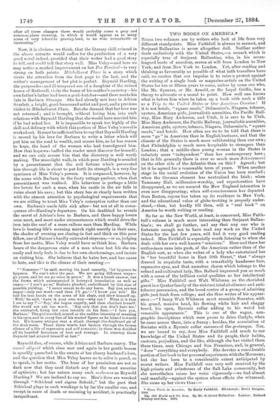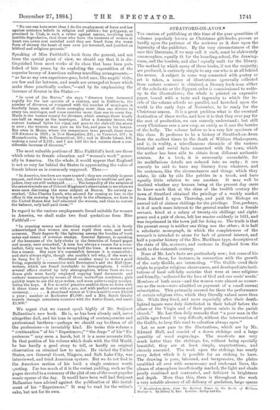TWO BOOKS ON AMERICA.* THESE two volumes are by writers
who look at life from very different standpoints. Miss Faithful' is always in earnest, and Serjeant Ballantine is never altogether dull. Neither author
deals exclusively with the United States,—a remark which is especially true of Serjeant Ballantine, who, in his seven- leagued boots of anecdote, moves at will from London to New York, and from New York to London. Yet, after reading and thinking as favourably as possible of what both travellers have said, we confess that our impulse is to raise a protest against the writing of a single book or magazine-article on the United States for ten or fifteen years to come, unless by some one who, like Mr. Spencer, or Mr. Arnold, or Sir Lepel Griffin, has a theory to advocate or a moral to point. How well one knows what is before him when he takes up a book with such a title as a Trip to the United States or Our American Cousins ! If it is not hotels, "square meals," Delmonico's, Niagara, tobacco, oysters, American girls, journalistic amenities, the Pacific Rail- way, Miss Mary Anderson, and Utah, it is sure to be Utah, Miss Mary Anderson, the Pacific Railway, journalistic amenities, American girls, oysters, tobacco, Niagara, Delmonico's, " square meals," and hotels. How often are we to be told that there is more "go " in American than in English business, and that the climate of the States is much more exhilarating than our own ; that Philadelphia is much more hospitable to strangers than London ; that a middle-class young woman in the States is infinitely more "independent" than her contemporary here ; that in life generally there is ever so much more Schwarmerei on the other side of the Atlantic than on this ? Agreed ; bat let it be agreed for a reasonable term of years. When another stage in the social evolution of the Union has been reached ; when the German element has neutralised the Irish ; when Tammany Hall, millionaire-worship, and expectoration have disappeared, as we are assured the New England intonation is even now disappearing ; when self-consciousness has departed from Boston, repose has taken up its residence in New York, and the educational value of globe-trotting is properly under- stood,—then, but hardly till then, will a " real book " on America be worth writing or reading.
So far as the New World, at least, is concerned, Miss Faith- full's volume is mach more interesting than Serjeant Ballan.- tine's ; we shall go further, and say that any one who is fortunate enough not to have read any work on the United States for the last few years, will find it very good reading indeed. Miss Faithfull is especially worth listening to when she deals with her own well-known " missions." Here and there her enthusiasm runs into gush, of the American rather than of the English sort, as when she writes of a lady who entertained her in " her beautiful home in East 39th Street," that " always dressed in exquisite taste, with a remarkably handsome face, expressive eyes, and that nameless charm which belongs to the refined and cultivated lady, Mrs. Ballard impressed you as much with a sense of the brilliant social qualities as her intellectual gifts." Miss Faithfull met Walt Whitman as the cherished guest in a Quaker family of the strictest total abstinence and anti- tobacco persuasion, and the loved centre of a group of admiring girls just fresh from college ; and she thus writes of his appear- ance :—"I fancy Walt Whitman must resemble Socrates, with his grand, massive head, his flowing white hair and shaggy beard, his open, Byronic collar adding to his weird but venerable appearance." This is one of the vague, non- graphic descriptions which were prone to drive Carlyle, when he came across them, into a frenzy ; besides, the association of Socrates with a, Byronic collar savours of the grotesque. Nor, we are bound to say, does Miss Faithfull add much to our knowledge of the United States and its people, their habits, customs, prejudices, and the like, although she has visited them three times, seen Chicago and San Francisco, and, in general, " done " everything and everybody. She devotes a considerable portion of her book to her personal experiences with the Mormons ; but she has been to a considerable extent anticipated by recent writers. Miss Faithfull was very well received by the high-priests and priestesses of the Salt Lake community, but she nevertheless raises her voice vigorously—we had almost said manfully—against the system whose effects she witnessed. She sums up her views thus :—
• Three Visits to America. By Emily Faithfull. Edinburgh: David Douglas. 1884.
The Old World and the New. By Mr. Ekrjeaut Ballantine. London: Richard Bentley and Son. 1881.
"No one can bate more than I do the employment of force and law against mistaken beliefs in religion and politics ; but polygamy, as practised in Utah, is such a crime against nature, involving such terrible degradation, that those who have the interests of women at heart can never rest satisfied until they are freed from the worst form of slavery the heart of man ever yet invented, and justified on biblical and religions grounds."
Speaking of Miss Faithfull's book from the general, and not from the special point of view, we should say that it is .dis- tinguished from most works of its class that have been pub- lished of late years, by its exploding the superstition of the superior luxury of American railway travelling arrangements,- " as far as my own experience goes, hotel cars, like angels' visits, are few and far between, and meals are arranged at hours which make them practically useless,"—and by its emphasising the increase of divorce in the States :—
" In most of the States," she says, "divorces have increased rapidly for the last quarter of a century, and in Califorria, the number of divorces, as compared with the number of marriages, is fearfully large, most of them averaging more than one divorce to every ten marriages, and some counties more than one to every five. Marin is the banner county for divorces, which average there nearly one-half as many as the marriages. After a domestic breeze, the eastern husband lights his cigar, and goes to the club till the storm is over ; the western man puts on his hat, and goes to his lawyer. But even in Maine, where the temperance laws prevail, there were 478 divorces in 1878 ; in New Hampshire, 241; in Vermont, 107; in Massachusetts, 600; in Connecticut, 501; and in Rhode Island, 106, making a total of 2,113 ; and I am told the last returns show a con- siderable increase of divorces."
The most valuable portions of Miss Faithfull's book are those which relate to female education and "woman's work" gener- ally in America. On the whole, it would appear that England is not so very far behind the States in appreciating the value of female labour as is commonly supposed. Thus :-
" In America, teachers are more trusted ; they are certainly in great request, and their work is excellent ; but, thanks to tradition and pre-
judice, they are still underpaid The inequality of the salaries of the sexes reminds me of Colonel Higginson's observation to me when we were once discussing the same subject at Boston. He naïvely re- marked, 'Like Charles Lamb, who attoned for coming so late to the office in the morning by leaving it early in the afternoon, we have in the United States first half.edncated the women, and then to restore the balance, only half-paid them.' "
In regard to the various employments found suitable for women in America, we shall make two final quotations from Miss Faithf all "In counting money and detecting counterfeit coin, it is freely acknowledged that women are more rapid than men, and more accurate. Their fingers fly like lightning among the bundles of bank notes and sheets of revenue stamps. General Spinner, in speaking of the keenness of the lady-clerks in the detection of forged paper and money, once remarked, 'A man has always a reason for a coun- terfeit, forty may be, but be is wrong half the time. A woman never ims a reason. She says it's counterfeit because it is counterfeit ; and she's always right, though she couldn't tell why, if she were to be hung for it.' Shorthand enables many to make a good living, especially in connection with Remington's and the Hall type- writers, which are found invaluable to stenographers. I visited several offices started by lady stenographers, where from six to a dozen girls were busily employed copying legal documents and authors' manuscripts by means of these marvellous machines ; girls quickly learn to use the type-writer, and seem quite to enjoy manipu- lating the keys. A few months' practice enables them to write with it three times as fast as with a pen, and with perfect neatness and
accuracy A shorthand writer at Utica is said to earn £1,600 a year ; another at Rochester £1,000; and a Mrs. Sarah Grasby travels through seventeen counties with the Assize Court, and earns £1,800."
We regret that we cannot speak highly of Mr. Serjeant Ballantine's new book. He is, as has been already said, never altogether• dull, and his tone in speaking of contemporaries and professional brethren—perhaps we should say brethren of all the professions—is invariably kind. He terms this volume a " continuation " of his " Experiences ;" "the dregs" of his " Ex- periences " may seem a harsh, but it is a more accurate title. In that portion of his volume which deals with the Old World, he has hardly a good story to tell, or hardly an original observation on criminal law to make. He visited the United States, saw General Grant, Niagara, and Salt Lake City, was interviewed, and tried American oysters. But we do not find in the. American section of his book a single sentence worth quoting. Far too much of it is the veriest padding, such as the pages devoted to a summary of the plot of one of the most popular comic operas of the day. It would have been well had Serjeant Ballantine been advised against the publication of this instal- ment of his " Experiences." It may be read for the writer's sake, but not for its own.



































 Previous page
Previous page